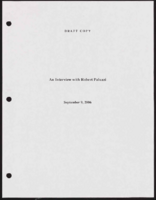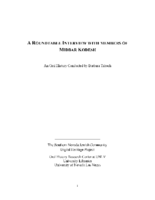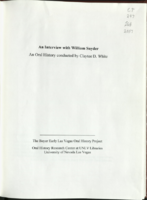Search the Special Collections and Archives Portal
Search Results

Mary Carol Melton interview, March 5, 1981: transcript
Date
Archival Collection
Description
On March 5, 1981, collector Kathy Ricks interviewed Mary Carol Melton (b. April 4th, 1900 in Rockville, Missouri) about her life in Nevada and the development of the United Methodist Church in Las Vegas. Melton speaks about moving to Las Vegas, Nevada because of her husband’s health, her time working with attorney offices and in the Las Vegas Courthouse, and the different homes in which her family lived. Moreover, Melton talks extensively about starting the first Sunday school in North Las Vegas in a garage as well as the church she and her husband built. Melton discusses the programs and minstrels performed in the church, the crafts sold to make money for the church and the organ they purchased. Lastly, Melton talks about going to the Hoover Dam nearly every week to see new developments, her participation in the Daughters of the American Revolution (DAR), and watching the above ground atomic tests.
Text

Transcript of interview with Robert Paluzzi by Claytee White, September 5, 2006
Date
Archival Collection
Description
Claytee White interviews Robert Paluzzi on September 5, 2006.
Text

Transcript of interview with Anne Kellogg by Suzanne Becker, July 25, 2007
Date
Archival Collection
Description
Anne Kellogg's paternal family came to Las Vegas in the 1950s. Then in the late 1960s, her mother arrived to teach school. After her parents married, they set up their first home in John S. Park neighborhood and whenever they moved to a larger house it was within the John S. Park neighborhood. And her father's business office was always nearby. Childhood memories include John S. Park Elementary School being a "hub" for all the neighborhood children no matter where they attended school. There was jumping on the Schofield's trampoline, roller-skating to Odyssey Records, and using Strip hotel tennis courts to practice her game. The Strip was not important in daily life, but if she got good grades, she got to play the Midway at Circus Circus Casino. As an adult, Anne still sees John S. Park as a nice neighborhood that holds an important spot in Las Vegas history. In addition, she offers thoughts on the so-called Manhattanization of Las Vegas, Downtown rehab and the birth of the Arts District, and about retail and being a business owner in the community.
Text

Louis Richardson interview, July 29, 2016: transcript
Date
Archival Collection
Description
As a youth, contractor Louis Richardson followed opportunities that would take him across the U.S. and to Sierra Leone, Africa. Originally from Charleston, South Carolina, Richardson attend Hampton Institute, in Hampton, Virginia, a historically black college/university (HBCU); there, he majored in construction and engineering and joined the Reserve Officers' Training Corps (ROTC). After graduation and U.S. Army service in Vietnam, he received an offer from U.S. State Department to teach young adults math and construction in West Africa. That experience led him to work for various Housing Authorities in New Jersey, Los Angeles, and finally, in 1978, to Las Vegas. In this interview, Richardson talks about how his early experiences shaped his vision of the types of projects he would undertake. He speaks about his focus on engineering how he came to Las Vegas and of the public works projects in schools, parks, and libraries that came to define his body of work. He explains the bid proces
Text

Transcript of interview with Dr. Harrie Fox Hess by Scot Siegel, February 26, 1979
Date
Archival Collection
Description
On February 26th, 1979, Scot Siegel interviewed his psychology professor, Dr. Harrie Hess (born March 1, 1929 in Hammond, Indiana) in his office at the University of Nevada, Las Vegas. Dr. Hess discusses his family’s reason for moving to Nevada and how he felt as a young adult moving to Las Vegas. The two go on to talk about Dr. Hess’ contributions to Nevada through his work as a psychologist, and briefly mentions the first law to be drafted on psychology certification in Nevada. Dr. Hess then describes the Wild Cat Lair as an important site of social recreation for early Las Vegas youth. The interview concludes with his memory of Boulder (Hoover) Dam and how he believes that workers from the Great Depression paved the way for industrial success in gambling due to their employment on the Dam.
Text

Transcript of interview with Marla Letizia by Barbara Tabach, August 26, 2015
Date
Archival Collection
Description
In this interview, Letizia discusses her career, and breaking gender barriers in both broadcasting as well as in advertising. She also talks about how her family ended up settling in Las Vegas, and the evolution of her relationship with Judaism from childhood to adulthood, eventually leading to her leadership roles with Congregation Ner Tamid as well as Jewish Federation, where she is on the Board of Directors.
Marla R. Letizia is the founder of Big Traffic Mobile Billboards in Las Vegas, Nevada. The company operates mobile billboard advertising trucks and employs brand ambassadors to carry WOBI? walking billboards for retail, gaming, and entertainment clients such as Caesars entertainment, Tropicana, and Cirque Du Soleil. Letizia founded Big Traffic in 2001 after leaving a successful broadcast journalism career to raise her two children. She met her husband, Tom Letizia, while working at KLAS-TV Channel 8 as an assistant production manager. She later became the first female director of live television news broadcasts in Las Vegas at Channel 8. She also developed a TV show called "Las Vegas Turnaround" and a syndicated production called "The Parenting Network." Letizia grew up in Las Vegas, and is a former president of Congregation Ner Tamid and a founding member of the board of trustees of the Meadows School in Las Vegas. In this interview, Letizia discusses her career, and breaking gender barriers in both broadcasting as well as in advertising. She also talks about how her family ended up settling in Las Vegas, and the evolution of her relationship with Judaism from childhood to adulthood, eventually leading to her leadership roles with Congregation Ner Tamid as well as Jewish Federation, where she is on the Board of Directors.
Text

Transcript of interview with Bobby Morris by Barbara Tabach, March 24, 2016
Date
Archival Collection
Description
In this interview, Morris reflects upon his career and the wide range of influential artists he has worked with, as a drummer, musical director and talent manager. Stories include playing with Louis Prima, live and on albums; serving as Elvis? musical director; filling in for Frank Sinatra?s drummer; entertaining Howard Hughes; and playing at President John F. Kennedy?s inauguration, to name a few. He also talks about his agency, attributing its success to the strong relationships he built with casino management.
Text

Transcript of roundtable interview with members of Midbar Kodesh, April 19, 2015
Date
Archival Collection
Description
In this interview, members of Midbar Kodesh discuss how they each became involved in the synagogue, and how the congregation formed in the mid-1990s. Some of the narrators grew up in Las Vegas and talk about the growth of the town and being former members of Temple Beth Sholom.
Text

Transcript of interview with Bill Snyder by Claytee White, November 21, 2008
Date
Archival Collection
Description
In 1978 Bill Snyder came Las Vegas for a heavyweight championship fight between his homeboy, Larry Holmes and Ken Norton. During that visit, he saw cranes dotting the cityscape so he returned home and proposed that the family move across country and settle in the desert. His wife, Joy, gave him a year. And as they say, the rest is history. And what am amazing history it is. In this interview, Bill Snyder talks about his life from its beginning in Easton, Pennsylvania, where he discovered the challenge of architecture first by perusing books in the library and then by hands-on construction experience. But his love of art built the foundation to this treasured craft that has allowed him to design homes, office buildings, airport terminals and the McCaw School of Mines on the campus of McCaw Elementary School in Henderson, NV. The projects that Mr. Snyder seems to prize most are those that include the imagination of children. The people who shaped his life are introduced and the impact of his military training is wonderfully expressed. His connection with young people is paramount throughout the oral history that is beautifully documented with images of many of the projects that displayed children's art in an exciting way. Bill and Joy are the parents of two sons. Dana age 36, lives with his wife Christine in Hollywood, California, and works as a voice actor best known for his role as Master Shake on the cartoon Aqua Teen Hunger Force. Their younger son, Mike age 31, owns The Krate, a clothing, music, and art shop in Santa Cruz, California, where he lives with his wife Mandy and daughter Maya. A husband, father, sports car enthusiast, runner, thinker and lover of teaching and trusting young people, Bill Snyder is a brilliant architect and manager of people. He is dyslectic and never expected a school to be named in his honor but the William E. Snyder Elementary School was dedicated in 2001 with overwhelming community support. One of his current goals is to dream an architectural project that rivals the McCaw School of Mines for his own school. I trust that you will learn to love architecture in a different and very profound way as you read this interview just as I did during my conversation with Bill.
Text

Louise LeClair interview, March 21, 1978: transcript
Date
Archival Collection
Description
On March 21, 1978, collector Dennis Luppens interviewed Louise LeClair (born July 28th, 1910 in Mesquite, Nevada) at her home in Las Vegas, Nevada. In this interview, Mrs. LeClair discusses her family history and education in Las Vegas, Nevada. She also discusses healthcare and talks about the flu epidemic of 1918 and how it affected Southern Nevada.
Text
